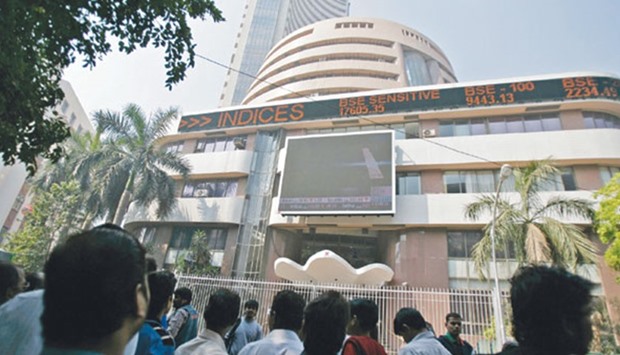India’s benchmark stock index tumbled the most in more than three months as concern over Chinese data and tension in the Middle East spurred a selloff in Asian equities and currencies.
Bharti Airtel, Idea Cellular and Reliance Communications slumped more than 4% each after the telecom regulator asked the cell-phone operators to comply with its earlier order to compensate users for call drops.
Tata Motors, the owner of Jaguar Land Rover, was the worst performer on the S&P BSE Sensex. Hero MotoCorp slid for a fourth day after posting a drop in December sales.
The Sensex declined 2.1% after capping a third weekly gain on Friday. China halted trading after a selloff triggered circuit breakers on the first day they took effect. The rout began after data showed manufacturing weakened for a fifth month. Losses in local stocks deepened after an index showed a contraction in India’s manufacturing for the first time in more than two years.
“China numbers are not looking good and after the year-end rally that we had, there are no immediate triggers for investors to look forward to,” said Alex Mathews, head of research at Geojit BNP Paribas Financial Services in Kerala. He’s advising investors to buy shares of road builders.
The Nifty Index tumbled 2.2% to 7,791.30. India VIX Index, a gauge of the cost of demand for protection against stock-market swings, surged the most since August 24.
The Sensex slid 5% last year, after rising 30% in 2014, as euphoria over Prime Minister Narendra Modi’s economic agenda waned and concern grew that tighter US monetary policy will curb the appeal of higher returns offered in emerging markets. Global funds bought $3.3bn of local shares in 2015, the smallest inflow in four years.
The Nikkei and Markit India Economics Index fell to 49.1 in December, the lowest since August 2013, data showed yesterday. A reading above 50 signals expansion while anything below that indicates a contraction. A similar gauge for crucial services growth is due tomorrow.
The data underscores Modi’s struggle to boost private investment in the face of legislative logjams, choked credit lines and weakened global prospects due to China’s slowdown. State spending has underpinned India’s growth, which the Finance Ministry forecasts at 7% to 7.5% in the year through March.
Bharti Airtel tumbled the most since August 24. Idea Cellular plunged 5.3%, extending last year’s 6.6% slide. Reliance Communications slid 6.6% after rallying 30% in the last quarter.
The Telecom Regulatory Authority of India has asked cell phone operators to pay users for call drops from January 1, even as the companies said they will pay only after court orders them to do so, the Press Trust of India reported.
Tata Motors plunged 6.2%, the most since August 24 after its December sales fell 4% from a year earlier. Hero MotoCorp slid 1.8% in a fourth day of decline after last month’s dispatches fell 5%.
ICICI Bank fell 2.8%, while State Bank lost 3.1%. Housing Development Finance Corp, the biggest mortgage lender, retreated 3.3%, the most since August 26.
The Sensex trades at 15.3 times projected 12-month earnings, compared with a multiple of 10.7 for the MSCI Emerging Markets Index.
Meanwhile the rupee fell the most since November on speculation demand for riskier assets will be hurt as tensions in the Middle East intensify and poor Chinese economic data adds to concern over global growth.
Emerging-market stocks and currencies slumped yesterday as manufacturing in China weakened for a fifth straight month, the longest such streak since 2009. The rupee depreciated 0.7% to 66.6150 a dollar in Mumbai, the biggest decline since November 9, according to prices from local banks compiled by Bloomberg. The S&P BSE Sensex index of shares tumbled 2.1%, the most in more than three months.
“The rupee’s fall is on account of worries over slowing world growth after weak Chinese data,” said Rohan Lasrado, Mumbai-based head of foreign-exchange trading at RBL Bank.

SENSEX
